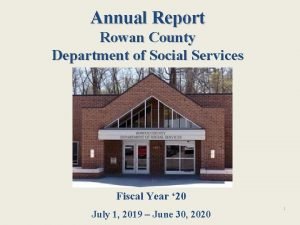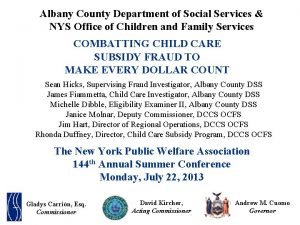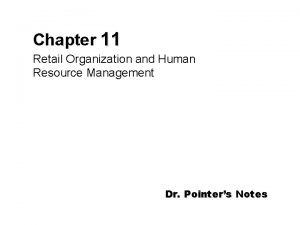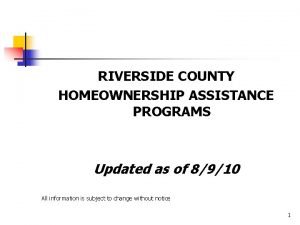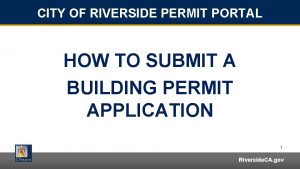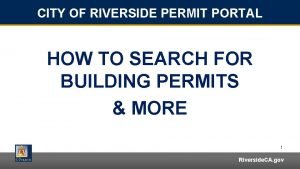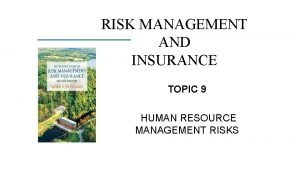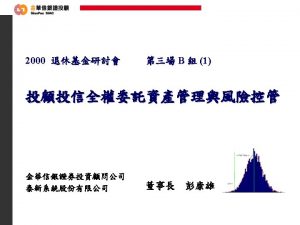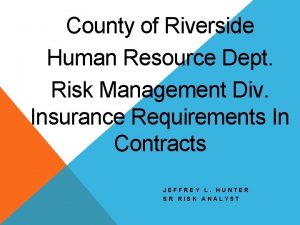County of Riverside Human Resource Dept Risk Management














- Slides: 14

County of Riverside Human Resource Dept. Risk Management Div. Insurance Requirements In Contracts JEFFREY L. HUNTER SR RISK ANALYST

INSURANCE REQUIREMENTS IN CONTRACTS The County’s insurance requirements are intended to protect the assets of the County when entering into contracts. Two methods used: Indemnification: Requires the contractor to indemnify, defend and hold harmless the County for any losses, claims, liability, etc. that may arise in connection with service provided under the contract. Insurance: The financial tool used to meet the indemnification obligation. Insurance provides funds to pay for losses that occur and provides protection to both the County and the contractor 3

TYPES OF BUSINESS INSURANCE REQUIRED • Commercial General Liability • Vehicle Liability • Workers’ Compensation / Employer’s Liability • Professional Liability (Errors & Omissions) 4

OTHER TYPES OF INSURANCE • • Excess / Umbrella Liability Property Fire & Casualty Pollution Liability Crime Coverage Builders Risk Special Events 5

INSURANCE LANGUAGE Insurance requirements are typically included in County contracts through insurance language within the contract or by exhibits. The insurance section explains the types and amounts of insurance required in the contract and details the contractor’s responsibility to provide proof of insurance. The County uses a variety of standard insurance language based on the type of work performed and the dollar value of the contract. The insurance language is part of the contract, and the insurance requirements are an enforceable term of the contract. 6

Evidence of Coverage • Certificates of Insurance: Verify types and amounts of coverage. Shows insurance companies and policy dates. • Endorsements: Amendments/modifications to policies. An endorsement is issued separately. Endorsement language appearing on a certificate of insurance is non-binding and does not meet the County’s requirements. 7

Additional Insured Endorsement Adds the County of Riverside to the contractor’s general liability policy loss caused by the acts of negligence of the contractor. County must be named correctly on the endorsement: COUNTY OF RIVERSIDE or COUNTY 8

ADDITIONAL INSURED ENDORSEMENT CONTINUE Certificate Holder VS Additional Insured • Certificate Holder: County received a copy of the certificate of insurance which provides “information only” of the required insurance coverage. • Additional Insured: County is added to the insurance policy and obtains a copy of the endorsement. • County needs to be a certificate holder and additional insured. 9

COUNTY’S REQUIRED ADDITIONAL INSURED LANGUAGE • As respects to the insurance section only, the COUNTY herein refers to the County of Riverside, its Agencies, Districts, Specials Districts, and Department, their respective directors, officers, Board of Supervisors, employees, elected or appointed officials, agents, or representatives as Additional Insureds. • Policy shall name the “COUNTY” as Additional Insured. 10

Role of Brokers and Agents • Insurance brokers and agents assist contractors with their insurance needs. • In your interactions with the County, your brokers/agents will provide you with documentation related to your insurance (usually certificates of insurance and endorsements) • You should provide a copy of the County’s insurance requirements to your broker/agent so that they know exactly what the County is looking for. • County’s Insurance Technical Manager can speak directly with agents/brokers to help clear up complicated issues. • Ensure that broker/agent is provided with correspondence from the County related to insurance. 11

Certificate of Insurance Monitoring • The County’s Risk Management Division is used by county departments to check compliance with insurance requirements. • Some County departments are also utilizing software to manage and maintain certificate of insurance data. 12

Some Common Errors • General Liability: Additional Insured Endorsement not provided. • General Liability: Additional Insured Endorsement provided but County not correctly named. • Auto Liability: Owned, Scheduled, Hired, & Non-Owned Autos are not properly identified. County should ask you during the contract process what kinds of vehicles you use in the provision of service, if any. • Cancellation Days does not meet required minimum. • Workers’ Compensation coverage not correctly identified on the certificate of insurance. 13

Some Common Errors, continued • A. M. Best Ratings: • Insurance companies are rated by A. M. Best • County requires that contractors insure with companies with at least an A- (Excellent) rating and a financial size category of V (policyholder surplus of $10 -25 million). • Non-rated companies, lower rated companies, and self insurance require waivers to be approved. Not all waiver requests will be approved. • Company ratings can slip, and this can cause a noncompliance issue. 14

Questions 15
 Rowan county dss
Rowan county dss Albany county department of social services
Albany county department of social services Time management human resources
Time management human resources Retail human resources
Retail human resources Hrm vs hrd
Hrm vs hrd Riverside county seal of multiliteracy
Riverside county seal of multiliteracy Down payment assistance riverside
Down payment assistance riverside Riverside permit
Riverside permit Riverside building and safety
Riverside building and safety Riverside county vso
Riverside county vso Riverside county library palm desert
Riverside county library palm desert Marius meyer missing
Marius meyer missing Market risk assessment
Market risk assessment Volusia county code enforcement
Volusia county code enforcement Volusia county growth and resource management
Volusia county growth and resource management
